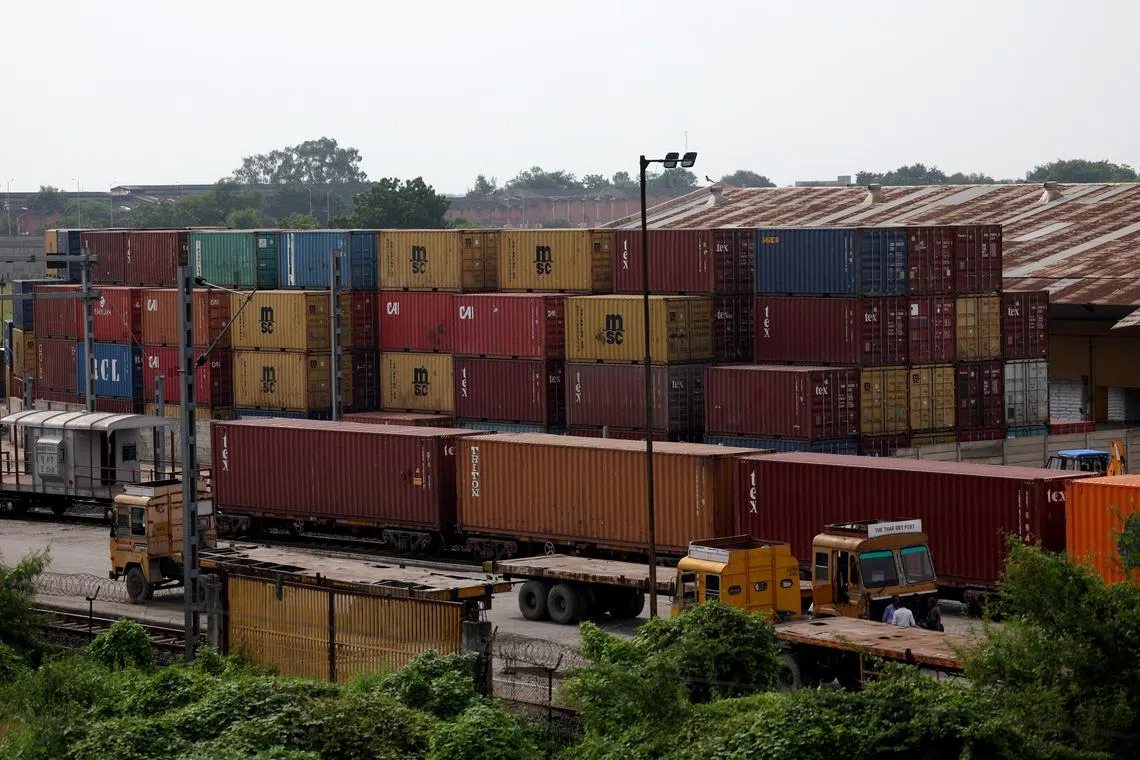Tariffs cause ‘unprecedented’ disruption to global trade rules, WTO chief says
Sign up now: Get ST's newsletters delivered to your inbox

Since US President Donald Trump began imposing higher import tariffs, the share of global trade conducted under the WTO’s most favoured nation terms is down from about 80 per cent.
PHOTO: REUTERS
GENEVA - The share of global trade done on WTO terms has fallen to 72 per cent and could fall further, amid the biggest disruption to the international trading system since World War II, the director-general of the World Trade Organisation said on Sept 2.
Since US President Donald Trump began imposing higher import tariffs
The principle requires WTO members to treat others equally and the decline has stoked concerns that the 30-year-old organisation set up to uphold free trade is being sidelined.
“We’re experiencing the largest disruption to global trade rules, unprecedented in the past 80 years,” Dr Ngozi Okonjo-Iweala told Reuters in an interview at the start of her second term at the helm of the Geneva-based trade watchdog.
“So it’s not surprising that some would question the global trading system... and predictability,” she said, adding: “As long as the majority of trade is taking place on MFN terms, I think we should celebrate that. We’re a long way from 50 per cent.”
“If tariffs are used in a geopolitical and geostrategic manner, there’s nothing we can do about it.”
Dr Okonjo-Iweala also warned that world trade could experience the effects of tariffs “later down the line” into 2026 as the recent surge in global commerce – driven by front loading of goods during the first half of the year – begins to subside.
This contributed to the WTO raising its global trade growth forecast from 0.2 per cent to 0.9 per cent in August.
“Possibly down the line, we’ll begin to see some other impacts, as the goods in the warehouses are exhausted, and impacts begin to come in, but we’ll see next year,” she said, adding that “some growth” was expected.
US funding
Dr Okonjo-Iweala, a former finance minister in Nigeria, voiced concern at the Trump administration’s plans to cut US$29 million (S$37.3 million) in funding to the WTO, alongside other organisations.
“The announcement is concerning, but I think that I’ll just say this: we’re working with USTR (the US Trade Representative),” she said, adding that she had not received any definitive pronouncement.
In March, Reuters reported that the US had paused contributions to the WTO.
The Geneva-based trade watchdog had an annual budget of 205 million Swiss francs (S$328.77 million) in 2024 of which Washington was due to contribute about 11 per cent.
WTO reform is one of Dr Okonjo-Iweala’s top priorities, and an openness from China to address industrial policies could help advance discussions, she said.
“I feel that there’s a chance, there’s an opening on the part of many members, including China,” Dr Okonjo-Iweala said.
Documents seen by Reuters in July showed that WTO members are aiming to streamline decision-making processes, and promote fairer industrial policies including subsidies amid a string of reform proposals.
Countries are trying to break years of paralysis in international trade negotiations, to revitalise a system which the previous WTO chief, Mr Robert Azevedo, described in April as dead.
“I’m done with pessimism. I am done with fear. What we need to do is look at optimism and those who are trying to actually solve problems,” she added, referring to states such as Britain, Australia and the United Arab Emirates.
Dr Okonjo-Iweala confirmed the imminent entry into force of an agreement to cut state subsidies for the fisheries sector – which will be the watchdog’s first global deal since 2017.
“We are three members away from ratification and I already have those three,” Dr Okonjo-Iweala stated, adding it could happen in the next few weeks.
A deal was agreed in 2022 but could not take effect until two-thirds of WTO states ratified it.
REUTERS


